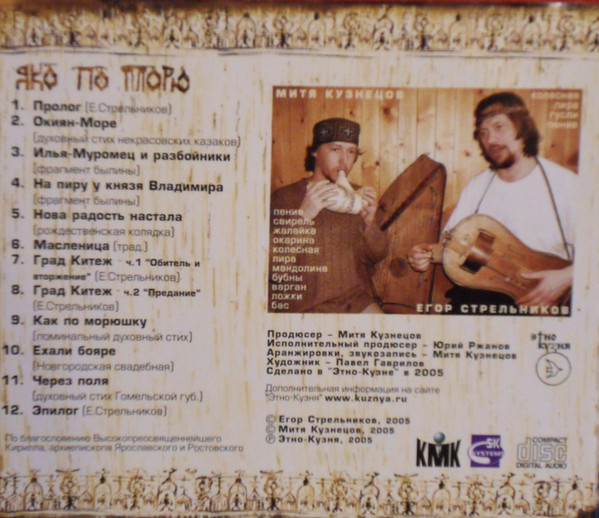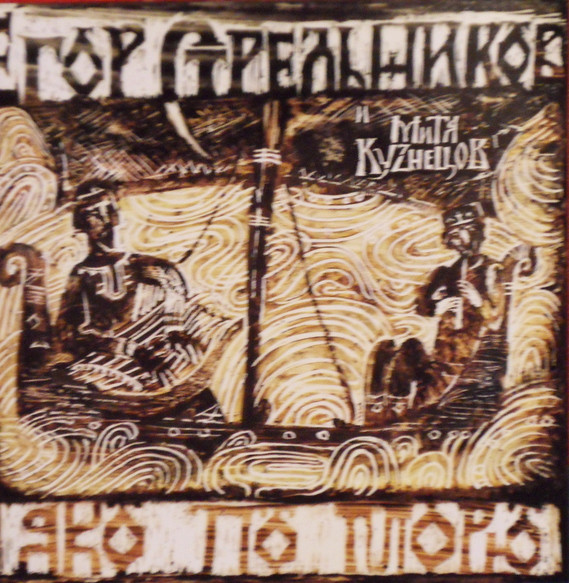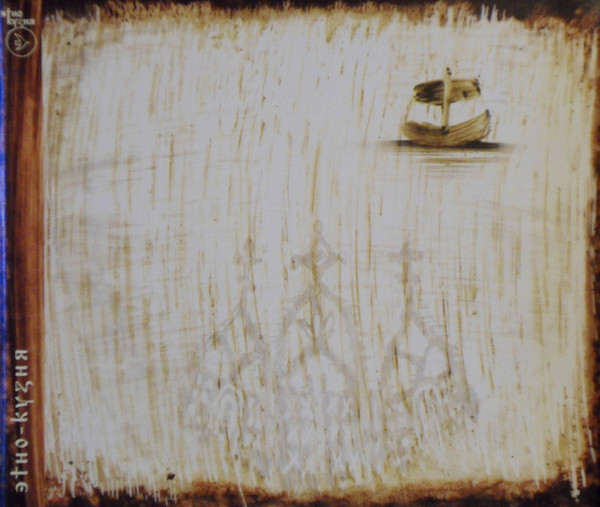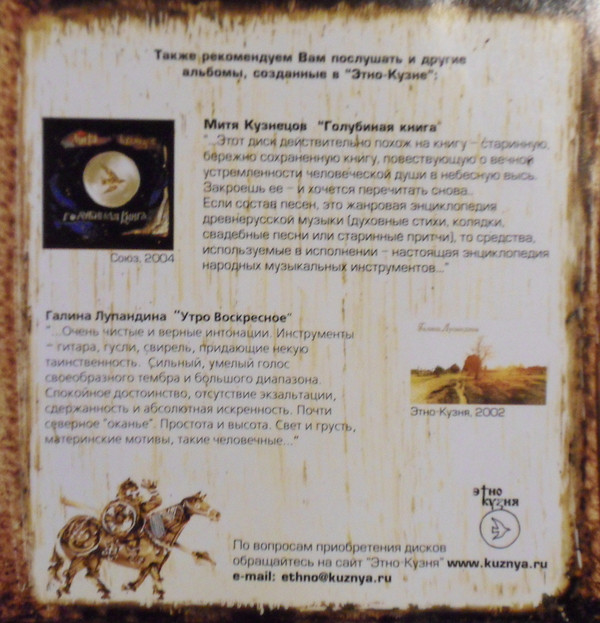Mitya Kuznetsov & Egor Strelnikov - Яко По Морю
Table of Contents
Download
Filename: mitya-kuznetsov-egor-strelnikov-yako-po-moryu.zip- MP3 size: 40.3 mb
- FLAC size: 604.5 mb
Tracks
| Track | Duration | Preview |
|---|---|---|
| Через Поля | ||
| Масленица | ||
| Эпилог | ||
| Пролог | ||
| Илья-Муромец И Разбойники | ||
| Град Китеж | ||
| Предание | ||
| Окиян-Море | ||
| Ехали Бояре | ||
| Нова Радость Настала | ||
| На Пиру У Князя Владимира | ||
| Как По Морюшку | ||
| Обитель И Вторжение |
Images




Catalog Numbers
KUZ 003Labels
EthnoSmithyListen online
- lytte på nettet
- ouvir online
- online luisteren
- online anhören
- lyssna på nätet
- escuchar en línea
- ascolta in linea
- écouter en ligne
- kuunnella verkossa
Formats
- CD
- Album
Credits
| Role | Credit |
|---|---|
| Backing Vocals | Anna Kuznetsova |
| Executive Producer | Yury Rzhanov |
| Painting | Pavel Gavrilov |
| Producer | Mitya Kuznetsov |
| Engineer | Mitya Kuznetsov |
| Arranged By | Mitya Kuznetsov |
| Design | Mitya Kuznetsov |
| Vocals | Egor Strelnikov |
| Gusli | Egor Strelnikov |
| Hurdy Gurdy | Egor Strelnikov |
| Pipe | Mitya Kuznetsov |
| Zhaleika | Mitya Kuznetsov |
| Ocarina | Mitya Kuznetsov |
| Mandolin | Mitya Kuznetsov |
| Tambourine | Mitya Kuznetsov |
| Drum | Mitya Kuznetsov |
| Oud | Mitya Kuznetsov |
| Spoons | Mitya Kuznetsov |
| Bells | Mitya Kuznetsov |
| Harp | Mitya Kuznetsov |
| Bass | Mitya Kuznetsov |
About Mitya Kuznetsov & Egor Strelnikov
MITYA KUZNETSOV took up music at 9, learning to play the accordion and singing in the choir in a music studio. He started his professional concerting career in his green years when, in 1987 as a
15-year-old son of the troop
, he took part in setting up the well-known folk group
Sedmaya Voda
(Seventh Water). His role in the group was immediately determined as a multi-instrumentalist, and he began mastering various folk instruments.
In two years time (1989) the group went on a tour of Ireland, and a year later (1990) they had a concert tour of nine states of the USA, where the first album,
Jolly Good!
, was recorded.
From 1992 till 1994 M. Kuznetsov works as a music editor of the Rybinsk Drama Theatre, at the same time creating his first instrumental album
Dancing Forest Fairies
, which sounded in Andrei Borisovs radio program
Exotics
(Moscow) for the first time (1993). In 1994, Kuznetsov records his second, this time song album "Skaz Vremirya" (Time Soarers Tale) made to the verses of
silver age
poets. That same year MK becomes a producer and arranger of the album
Hug Me, Heaven
by Elena Romanova, a singing author. Together with the other participants of
Seventh Water
he takes part in the film
Earthen Homeland
.
In 1995, a Belgian film director and music publisher Michel Drachoussoff produces the recording of the album
The Best of Sedmaya Voda
. In the course of the studio sessions, he pays attention to the creative abilities of the young musician and offers Kuznetsov to work for the Belgian label MDC as a composer and a multi-instrumentalist. Late in the year, after a tour in Germany, M.Kuznetsov leaves the group and in 1996 he goes to represent Russia at the world-known cultural Leipzig Fair with his project "Skaz Vremirya" (Time Soarers Tale). Later that year in Belgium MK records his first musical fairytale to A.S.Pushkins
Tale of the Dead Princess and Seven Warriors
, which is published by MDC for Russia.
In 1997, he records another folk tale,
Princess-Frog
at the Brussels studio and takes a two-month break in the studio session for a trip to America where he goes on the invitation of his friends, a famous country musician Bill Clifton and his wife Tineke.
During his stay in America Mitya learn from Bill about country traditions, and the musicians give joint concerts in the heart of country music, Carter Fold, VA. In Johnson City the Russian musician meets another well-known country group
Brother Boys
and perform with them.
Meeting with another representative of American culture, a Native American flutist Carlos Nakai, helps Kuznetsov later in his work at the music to the film
West America
( directed by Michel Drachoussoff) about the culture and nature of Western America. The soundtrack was recorded at the MDC studio in Brussels in 1997.
After two-year break up, the musicians of
Seventh Water
come together again for an anniversary concert. In 1999, Alexandre Samoilov (folk group
Last Chance
) organizes a concert tour of
Seventh Water
in Germany and Ausria. After the tour he invites M.Kuznetsov to go to Europe as a participant of his own group.
In 2000,
Seventh Water
records the album
People they live&
and after that Mitya leaves the group for good.
In the same year 2000, the musicians of folk-rock group
Raznotravie
(Wild Flower Mix) invite him to work on their songs and act as the producer and arranger of their first studio album. Having made a preliminary recording of the musicians,
ethno-smithy prisoner
Kuznetsov sentences himself to half year creative labour in the mines, and in 2001 the album
Hard Labour
is released. Not limiting himself to the result, Mitya Kuznetsov starts a joint folk project with
Raznotravie
. He stages a theatrical show which was made into a film by the program
Archeology of Sound
(NTV channel) and shown worldwide. The album
Hard Labour
is recognized by the majority of Russian musician critics and journalists as one of the brightest Russian releases in contemporary folk music.
During three years of joint work the project
Raznotravie and Mitya Kuznetsov
successfully makes its way to the Russian folk stage. The musicians give lots of concerts in Moscow and other cities of Russia. The project is invited to international festivals as a headliner:
Suklegos-2002
(Kaunas,Lithuania),
Regioo-2003
(Tartu,Estonia),
Aisus-Kankleliai-2003
(Panevezhis,Lithuania).
At the folk festival
NovaEra
Skopje(Macedonia) where such performers as Givan Gasparyan, Ross Daly, De-Phazz, etc also take part, its organizer, the legendary Macedonian musician Goran Tanevski names
Raznotravie and Mitya Kuznetsov
the best participants.
In 2003, the director of information centre of the UN in Moscow A.S. Gorelik invites personally Mitya Kuznetsov and Raznotravie to perform the celebration of World Day of the UN. The guests of the party the workers of UN agencies, representatives of ministries, directorates, non-governmental organizations, scientific and cultural establishments of Russia are unanimous in commenting on the high professional level and novel style of their performance.
Alongside with that, MK does a lot of studio work, and in 2002 he records music to the documentary
The Roads
(directed by Marat Magambetov, POP TUTU Film production, supported by TV channel ARTE and MDM foundation, Germany). He produces the album
Morning of Resurrection
by a folk performer Galina Lupandina.
In 2003,
Raznotravie
break up.
Mitya Kuznetsov sums up his 9-year (1995-2004) work over the solo album
The Book of Dove
with little-known ancient Russian songs by recording the album in his own Ethno-Smithy.
2004 becomes a very fruitful year.
The Book of Dove
is released by the biggest Russian lable Concern
Group SOYUZ
. In the course of the year M.Kuznetsov records original music to a film about China (directed by Robert-Emile Canat, France) and releases the album
Chine, un voyage imaginaire
(
An Imagined Journey to CHINA
). He re-records the music to the film
West America
for its release as an independent album.
In 2005, Mitya Kuznetsov is a producer of another Russian album,
Over the Seas
joint with the psaltery (gusli) player Egor Strelnikov. The album of Russian spiritual and epic songs is released on his own label
Ethno-Smithy
, and according to journalists opinions it is one of the brightest releases of the past year in world music in Russia. In the end of the year M.Kuznetsov records original music to a film about Scotland
Ecosse, Dernier Paradis dEurope
(directed by Luc Giard, France), releases the album
Ecosse, Poesie Celte
(
Scotland, Celtic Poetry
). He records a version of an African folk song
Kothbiro
(Ayub Ogada) to a film about Kenya by a French film and TV director Patrick Bernard, the founder of ANAKO.
Real Name
- Dmitry Kuznetsov
Name Vars
- Митя Кузнецов
Aliases
- Митя Кузнецов